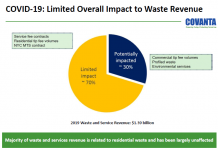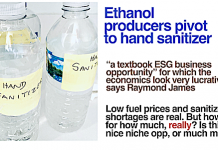Priming the E85 Pump
This Sunday, I had dinner with my aunt, who lives in Chicago. She recently bought an Impala LT (she’s a loyal GM customer), and was surprised when she received a $1000 debit card with which to buy E-85, the 85% Ethanol, 15% gasoline blend used in flex-fuel vehicles.

I was not able to find any web reference to this offer (including on the GM website), but Google still had a cached article from HowStuffWorks.com which explained: To help defray fuel costs, GM, as part of its "Live Green, Go Yellow" E85 ethanol campaign, gives buyers of its flex-fuel vehicles a $1000 debit card toward the purchase of E85 ethanol fuel. (As of November 2006, the offer was good only to buyers in the Chicago and Minneapolis areas.)
To me, this is a sign of desperation, both on the part of GM to sell a car rated 16 MPG city / 24 MPG highway as "green." If GM really wants to help defray fuel costs, might I suggest not fighting increased CAFE standards?
It’s also quite possibly a sign of desperation on the part of Midwest ethanol producers, who are producing ethanol at a record pace despite rising corn prices, but have difficulty transporting it out of the region because the corrosive and water-absorbing nature of ethanol means that it must be transported by truck or rail rather than pipelines. I speculate that Ethanol producers and distributors contributed to these debit cards as a way to make new Flex-Fuel vehicle owners aware that they could use E-85 and to give them the incentive to seek out and become familiar with the stations where E-85 is available.
For Investors
Is this good news for Ethanol investors? Possibly. It’s a clever way to overcome some of the biggest barriers to E-85 use: lack of familiarity with the fuel, and lack of awareness among flex fuel vehicle owners. Ethanol producers have taken a beating in the stock market, but if this campaign and others like it are successful, they may spur demand for ethanol in precisely the region where we have over-capacity.
Investors should not consider ethanol stocks to be particularly green, but ethanol does begin (in a small way) to address the problem posed by peak oil: how do we get liquid fuel from other sources which we can use in our current car fleet? So an investor more concerned about peak oil than global warming might consider taking another look at ethanol stocks now that they’re selling at much better prices than they were just a few months ago. However, I still prefer producers based outside the Midwest or ones that also own the corn they use.
DISCLAIMER: The information and trades provided here are for informational purposes only and are not a solicitation to buy or sell any of these securities. Investing involves substantial risk and you should evaluate your own risk levels before you make any investment. Past results are not an indication of future performance. Please take the time to read the full disclaimer here.









You see to me we should be encouraging auto manufactures to be trying different ways to get consumers to buy into alternative energy like this rather than just bumping up CAFE standards. CAFE standards don’t take consumer demand into account – but trying to build it with programs like this might work. Now I don’t know if this program in particular is the solution, but its at least not contrary to free markets like CAFE standards are. I’ve done some work with the AAM and I’m totally in favor of trying different solutions, but just hiking CAFE and thinking you did something positive isn’t going to work.
Kprs- I’d agree with you, if corn ethanol were actually a solution to the problem of Global Warming. It isn’t.
If all you’re worried about is peak oil, then it’s not so bad.
Comments are closed.